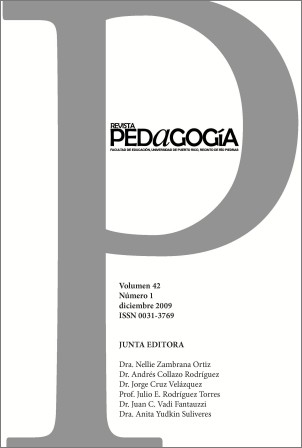Résumé
En este artículo invito a discutir la importancia de las emociones en la agenda pedagógica y psicológica para superar el dualismo de razón y emoción. En el quehacer pedagógico, como en la vida, somos como actores que ponemos nuestra alma y corazón en nuestro trabajo. Las emociones son esenciales en nuestros procesos de toma de decisiones ya que son el motor del sistema límbico —nuestro cerebro emocional— el cual está conectado al aprendizaje y la motivación. De aquí que nuestro aprendizaje y enseñanza son auténticos y holísticos cuando están entrelazados en nuestras emociones. Por ello presento la propuesta para una pedagogía de la e(moción) que es capaz de movernos hacia la problematización constante y a entablar puentes más poderosos que atraviesen la cognición como proceso político y social. Para la formulación de este concepto elaboro varios discursos que deconstruyen las fronteras entre el enseñar, pensar y el sentir, tomando de base elaboraciones que resaltan nuestra herencia filogenética, cultural e histórica.
Cómo citar:
Zambrana-Ortiz, N. (2011). Pedagogy in (e)motion: Bridges across cognition. Pedagogía, 42(1), 145-170. Recuperado a partir de https://revistas.upr.edu/index.php/educacion/article/view/16669
Références
Álvarez, H, J. (2006). Los hallazgos de las neurociencias y su aplicabilidad a lo sala de clases: teoría y práctica. Guaynabo, PR: Ediciones Santillana.
Csikszentmihalyi, M. (1996). Creativity: Flow and the psychology of discovery and invention. New York: Harper Perennial.
Damasio, A. R. (2003). Looking for Spinoza: Joy, sorrow, and the feeling brain Orlando, FL: Harcourt Press.
Damasio, A. R. (1994). Descartes‘s Error: Emotion, reason, and the human brain.New York: Avon Books.
Del Río, P. & Álvarez, A. (2007). From the psychology of drama to the drama of psychology: The relationship between the life and work of Lev S. Vygotsky. Estudios de Psicología, 28(3), 303-332.
Forgas, J. P. (1998). On feeling good and getting your way: Mood effects on negotiator cognition and bargaining strategies. Journal of Personality and Social Psychology, 74, 565-577.
Fredrickson, B. L. (1998). What good are positive emotions? Review of General Psychology, 2(3), 300-319.
Freire, P. (1998). Teachers as cultural workers: Letters to those who dare teach. Colorado, USA: Westview.
Freire, P. (2005, décima edición). Pedagogía de la indignación. Madrid: Ediciones Morata.
Freire, Paulo. (1993). Pedagogía de la esperanza. Un reencuentro con la pedagogía del oprimido. Siglo XXI Editores.
Freire, P. (1990). La naturaleza política de la educación: cultura, poder y liberación. Barcelona: Paidós.
Gadanho, S. C., & Hallam, J. (2001). Robot learning driven by emotions. Adaptive Behavior, 9(1).
Goleman, D. (1995). Emotional Intelligence.New York: Bantam.
Hatton, S. D. (2005). Teaching by heart: The Foxfire Interviews. New York: Teachers College.
hooks, b. (1994). Teaching to transgress: Education as the practice of freedom. New York: Routledge.
Isen, A. M., & Baron, R. A. (1991). Positive affect as a factor in organizational behavior. Research in Organizational Behavior, 13, 1-53.
Isen, A. M., & Daubman, K. A., & Nowicki, G. P. (1987). Positive affect facilitates creative problem solving. Journal of Personality and Social Psychology, 52, 1122-1131.
Kincher, J. (1990). Psychology for kids. MN: Free Spirit Publishing.
Kincheloe, J. (2004). Critical pedagogy: Primer. New York: Peter Lang.
Kincheloe, J. (1993). Toward a critical politics of teacher thinking: Mapping the postmodern. Westport, CN: Bergin & Garvey.
Le Doux, J. (2000). Emotion cicuits in the brain. Annual Reviews Neuroscience, 23, 155-1.
Le Doux, J. (1996). Ther emotional brain: The mysterious underpinnings of emotional life. New York: Touchstone.
Lucci, M.A. (2006). La propuesta de Vygotski: La psicología socio-histórica. Revista de Curriculum y Formación del Profesorado, 10. Retrieved from http://www.ugr.es/local/recfpro/REV102COL2.pdf
McLaren, P. (1995). Critical pedagogy and predatory culture. New York: Routledge.
Meyer, D.K. & Turner, J.C. (2002). Discovering emotion in classroom motivation research. Educational Psychologist, 37(2), 107-114.
Moll, L. (1992). Vygotsky and education: Instructional implications of sociohistorical psychology. New York: Cambridge University Press.
Maturana, H. (2002). Transformación en la convivencia. (2da ed.). Venezuela: Dolmen Ediciones.
Nafted, H.; Blakar, R.; Carlquist, E.; Phelps, J. & Rand-Hendrinksen, K. (2007). Ideology and power: The influence of current neo-liberalism in society. Journal of Community Applied Social Psychology, 17, 313-327. Published online in Wiley InterScience (www.interscience.wiley.com) DOI: 10.1002/casp.931
Park, S. (2004, Jan.). Building bridge between learning and positive emotion: How to apply emotional factor in instructional designing process? Vol. 1, Annual Proceedings of the Association for Educational Communications and Technology, 27th, Chicago, IL.
Plutchick, R. (2001). The nature of emotions. American Scientist, 89(4), 344- 350.
Plutchik, R. (1980). A general psychoevolutionary theory of emotion. In R. Plutchik & H. Kellerman (Eds.), Emotion: Theory, research, and experience: Vol. 1. Theories of emotion (pp. 3-33). New York: Academic.
Rodríguez Arocho, W. (2007). La investigación educativa en la América Latina: Cuatro desafíos y algunas ideas para enfrentarlos. Pedagogía, 41, 5-19.
Rodríguez Arocho, W. (2000). El tema de la conciencia en la psicología de Vygotsky y en la pedagogía de Freire: Implicaciones para la educación. En A. Villarini Jusino, D. Schipani & F. Noriega (Eds.) 10mo Encuentro Nacional de Educación y Pensamiento: Globalización, pensamiento crítico y pedagogía de la liberación (pp. 178-192). Universidad de Puerto Rico.
Salovey, P. & Mayer, J.D. (1990). Emotional intelligence. Imagination, Cognition, and Personality, 9, 185-211.
Vega, A. L. (2008). Mirada de doble filo. San Juan: Editorial Universidad de Puerto Rico.
Vygotsky, L. S. (1995a). El desarrollo de los procesos psicológicos superiores. Barcelona: Crítica.
Vygotsky, L. S. (1995b). Pensamiento y Lenguaje. Barcelona: Paidós.
Vygotsky, L. S. (1978). Mind in society. Cambridge, MA: Harvard University Press.

Ce travail est disponible sous licence Creative Commons Attribution - Pas d’Utilisation Commerciale 4.0 International.

